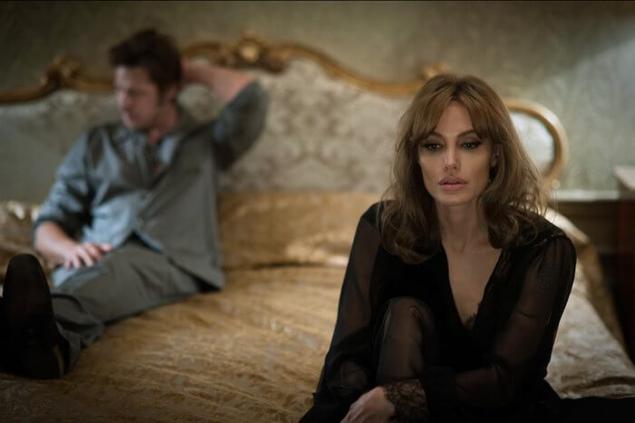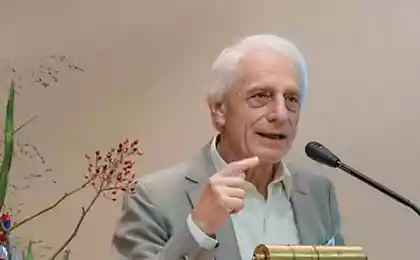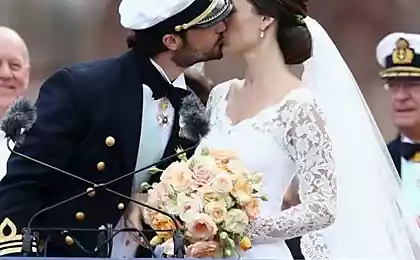501
What is wrong with you?
We are very afraid that this could happen to us. We go to great lengths to avoid it. And yet we do it anyhow, marry the "wrong" person.
In part, this is because we have a lot of complicated issues that emerge when we try to get close to someone. We only seem normal to those who do not know us very well. More wise, more conscious society than ours, a standard question on a first date would be: "What is wrong with you?".

Maybe we have a hidden tendency to fall into a rage when someone disagrees with us, or relax only when we work; we might cheat in the intimate life or closes in response to the humiliation. No one is perfect. The problem is that before marriage we rarely delve into these features.
As soon as our everyday relationships threaten to reveal our shortcomings, we immediately begin to blame our partners and leave them on. As for our friends, they don't care enough to take the trouble to enlighten us. One of the perks of single life is the sincere belief that we really are the people easy to live with.
Our partners know myself no more. Naturally, we try to understand them. We go to visit them, look at their photos, seeing their friends. All this contributes to the feeling that we did our homework. But it's not. The end result of marriage is encouraging, generous, infinitely kind gambling game, which plotting two people who still do not know who they are or who will be their partner. They are connected by ties to a future that they can't and don't want to imagine.
For many centuries people were married in virtue of logical reasons: because her land was adjacent to your, his family had a thriving business, her father was a judge in the city, was necessary to keep in good condition the castle, or the parents of both couples signed up under one interpretation of sacred text.
And from such a reasonable marriage stemmed loneliness, betrayal, violence, bitterness and screams that are heard from the nursery. Marriage is reasonable in fact it is not reasonable — beneficial, elitist and exploitative. That is why replacing his love needs no advertising.
In love marriage the fact that two people irresistible drawn to each other and know in my heart that it is right. Indeed, the more imprudent it seems marriage (maybe it's only been six months since I first met you; one of the future spouses is not working or both just got out of adolescence), so it is safer.
Audacity will outweigh all the mistakes a reasonable solution, this catalyst unhappiness, this exacting bookkeeper. The prestige of the instinct — injured reaction to the many centuries of the domination of the irrational mind.
But although it is believed that we all search for happiness in a marriage, all is not so simple. What we are really seeking is intimacy, which could complicate any plans that we have built to obtain happiness.
We strive to recreate in our adult relationships, those feelings that we knew so well in childhood. To the love that we experienced at the dawn of adolescence, often mixed with other, more disruptive change: the sensation of the desire to help an adult who has lost self control, feeling of helplessness, when you do not receive the parental warmth or fear of parental anger, feelings of lack of confidence to Express their desires.
It is therefore logical that we, as adults, reject some candidates for marriage, not because they are bad, but because too good, too balanced, Mature, intelligent, and reliable — given that deep down this feels correct as an alien. We're getting married for the wrong people, because we associate "to be loved" with "to feel happy".

We make mistakes because we are alone. If we consider an intolerable burden a chance to be alone, we will not be able to choose a partner in the optimum mood. We must fully come to terms with the prospect of many years of solitude to be properly legible; otherwise, we risk much more to love what we are no longer alone than a partner who has delivered us from such a fate.
Finally, we marry, to make pleasant feelings are permanent. We think that marriage will help us to preserve the joy that we felt when the idea to make the proposal first came to us: maybe we were in Venice, in the lagoon, the boat and the evening sun gilded the sea, talking about aspects of our souls, which, it seems, no one had ever touched, and knew that later go to dinner at a place that serves risotto. We got married, to make that feeling permanent, but are unable to see that there is a strong link between these feelings and the institution of marriage.
And really, marriage is changing our lives, guiding her to a more administrative track, where, perhaps, there is a country house and a long journey on suburban transport and maddening children who kill the passion that spawned them. The only common ingredient is a partner, and this is probably the wrong ingredient.
The good news is that it does not matter if we found what went "wrong" person.
We should not abandon him or her only on the basis of romantic ideas on which the understanding of marriage in the West is based of the last 250 years: there is a perfect being who can satisfy all our needs and fulfill our desires.
We need to change the romantic view of the tragic (and somewhat comedic) understanding that each person will disappoint, anger, irritate and frustrate us — and we will (without any malice) to do the same in turn. No end to our feeling of emptiness and imperfection. But it's nothing special — and it is not grounds for divorce. Choosing to whom we entrust ourselves, we just choose which particular kind of suffering we most want to accept to sacrifice themselves.
This philosophy of pessimism offers a solution to many of the sorrows and anxieties around marriage. This may seem strange, but pessimism relieves excessive pressure that our romantic culture places on marriage. Unsuccessful attempt of the specific partner to save us from the grief and anguish is not an argument against this man and does not mean that the Union is doomed to fail or should be reconstructed.
The person who is best suited to us is not the person who shares all our tastes (he or she does not exist), but the person with the mind to overcome the differences in the tastes of the person who is good at divergence. It is necessary to abandon the imaginary ideas of perfect complementarity. A true indication that you found "not too wrong" person is his ability to endure differences of opinion with generosity. Compatibility — the result of love; it should not be a condition.
See also: 5 rules to live by head of Amazon Jeff Bezos
Bugs adult women
Romanticism useless for us, it is a harsh philosophy. He made so many of what we go through in marriage, seems to us to be exceptional and terrible. In the end we remain alone and convinced that our Union, with its imperfections "crazy". We must learn to adapt to the "irregularities" of each other, always trying to learn more forgiving, humorous and kind perspective on numerous examples of these "imperfections" in ourselves and in our partners. published
Author: Alain de botton, the translation of Maria Stroganova
P. S. And remember, only by changing their consumption — together we change the world! ©
Source: www.matrony.ru/pochemu-vyihodyat-zamuzh-ne-za-togo/
In part, this is because we have a lot of complicated issues that emerge when we try to get close to someone. We only seem normal to those who do not know us very well. More wise, more conscious society than ours, a standard question on a first date would be: "What is wrong with you?".

Maybe we have a hidden tendency to fall into a rage when someone disagrees with us, or relax only when we work; we might cheat in the intimate life or closes in response to the humiliation. No one is perfect. The problem is that before marriage we rarely delve into these features.
As soon as our everyday relationships threaten to reveal our shortcomings, we immediately begin to blame our partners and leave them on. As for our friends, they don't care enough to take the trouble to enlighten us. One of the perks of single life is the sincere belief that we really are the people easy to live with.
Our partners know myself no more. Naturally, we try to understand them. We go to visit them, look at their photos, seeing their friends. All this contributes to the feeling that we did our homework. But it's not. The end result of marriage is encouraging, generous, infinitely kind gambling game, which plotting two people who still do not know who they are or who will be their partner. They are connected by ties to a future that they can't and don't want to imagine.
For many centuries people were married in virtue of logical reasons: because her land was adjacent to your, his family had a thriving business, her father was a judge in the city, was necessary to keep in good condition the castle, or the parents of both couples signed up under one interpretation of sacred text.
And from such a reasonable marriage stemmed loneliness, betrayal, violence, bitterness and screams that are heard from the nursery. Marriage is reasonable in fact it is not reasonable — beneficial, elitist and exploitative. That is why replacing his love needs no advertising.
In love marriage the fact that two people irresistible drawn to each other and know in my heart that it is right. Indeed, the more imprudent it seems marriage (maybe it's only been six months since I first met you; one of the future spouses is not working or both just got out of adolescence), so it is safer.
Audacity will outweigh all the mistakes a reasonable solution, this catalyst unhappiness, this exacting bookkeeper. The prestige of the instinct — injured reaction to the many centuries of the domination of the irrational mind.
But although it is believed that we all search for happiness in a marriage, all is not so simple. What we are really seeking is intimacy, which could complicate any plans that we have built to obtain happiness.
We strive to recreate in our adult relationships, those feelings that we knew so well in childhood. To the love that we experienced at the dawn of adolescence, often mixed with other, more disruptive change: the sensation of the desire to help an adult who has lost self control, feeling of helplessness, when you do not receive the parental warmth or fear of parental anger, feelings of lack of confidence to Express their desires.
It is therefore logical that we, as adults, reject some candidates for marriage, not because they are bad, but because too good, too balanced, Mature, intelligent, and reliable — given that deep down this feels correct as an alien. We're getting married for the wrong people, because we associate "to be loved" with "to feel happy".

We make mistakes because we are alone. If we consider an intolerable burden a chance to be alone, we will not be able to choose a partner in the optimum mood. We must fully come to terms with the prospect of many years of solitude to be properly legible; otherwise, we risk much more to love what we are no longer alone than a partner who has delivered us from such a fate.
Finally, we marry, to make pleasant feelings are permanent. We think that marriage will help us to preserve the joy that we felt when the idea to make the proposal first came to us: maybe we were in Venice, in the lagoon, the boat and the evening sun gilded the sea, talking about aspects of our souls, which, it seems, no one had ever touched, and knew that later go to dinner at a place that serves risotto. We got married, to make that feeling permanent, but are unable to see that there is a strong link between these feelings and the institution of marriage.
And really, marriage is changing our lives, guiding her to a more administrative track, where, perhaps, there is a country house and a long journey on suburban transport and maddening children who kill the passion that spawned them. The only common ingredient is a partner, and this is probably the wrong ingredient.
The good news is that it does not matter if we found what went "wrong" person.
We should not abandon him or her only on the basis of romantic ideas on which the understanding of marriage in the West is based of the last 250 years: there is a perfect being who can satisfy all our needs and fulfill our desires.
We need to change the romantic view of the tragic (and somewhat comedic) understanding that each person will disappoint, anger, irritate and frustrate us — and we will (without any malice) to do the same in turn. No end to our feeling of emptiness and imperfection. But it's nothing special — and it is not grounds for divorce. Choosing to whom we entrust ourselves, we just choose which particular kind of suffering we most want to accept to sacrifice themselves.
This philosophy of pessimism offers a solution to many of the sorrows and anxieties around marriage. This may seem strange, but pessimism relieves excessive pressure that our romantic culture places on marriage. Unsuccessful attempt of the specific partner to save us from the grief and anguish is not an argument against this man and does not mean that the Union is doomed to fail or should be reconstructed.
The person who is best suited to us is not the person who shares all our tastes (he or she does not exist), but the person with the mind to overcome the differences in the tastes of the person who is good at divergence. It is necessary to abandon the imaginary ideas of perfect complementarity. A true indication that you found "not too wrong" person is his ability to endure differences of opinion with generosity. Compatibility — the result of love; it should not be a condition.
See also: 5 rules to live by head of Amazon Jeff Bezos
Bugs adult women
Romanticism useless for us, it is a harsh philosophy. He made so many of what we go through in marriage, seems to us to be exceptional and terrible. In the end we remain alone and convinced that our Union, with its imperfections "crazy". We must learn to adapt to the "irregularities" of each other, always trying to learn more forgiving, humorous and kind perspective on numerous examples of these "imperfections" in ourselves and in our partners. published
Author: Alain de botton, the translation of Maria Stroganova
P. S. And remember, only by changing their consumption — together we change the world! ©
Source: www.matrony.ru/pochemu-vyihodyat-zamuzh-ne-za-togo/
























